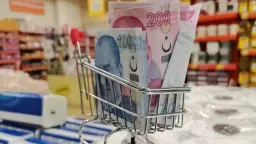Since we will have difficulty in accessing funds for borrowing, we will invest and consume less. This will contribute to current account balance positively.
Last week balance of payments statistics for September were announced. Chief among the striking developments was the worsening of the current account balance. Current account balance can fluctuate remarkably due to seasonality effects. For the purposes of economic analysis, however, adjusted movements matter. For this adjustment, I took into account the seasonal movements for three main current account balance items (namely export of goods, import of goods and net foreign exchange (FX) inflow from tourism and construction services). Second, I took into account the non-energy current account balance that excludes energy payments.
European economy to shrink
Figure 1 shows the movements in the mentioned two variables since the beginning of 2009, in US$ terms (positive sign mark current account deficit). From March to September, both indicators moved down significantly. In September, however, a movement towards the other way around was seen: both current account deficit and non-energy current account deficit increased. Will this negative development continue? Ahead are possible developments which could cause both a fall and rise in the current account deficit. The net effect will most likely be healing.
Let me start with the negative factor. The European economy is in a deep crisis and the expected growth rate for 2012 is being revised down constantly. Therefore, the market which receives almost half of Turkey’s exports is faced with the risk of recession and even contraction. This also means that the competition for share in the European market will be harsher. Our main rivals in the European market, excluding developed economies, are Brazil, China, Indonesia, India, Korea, Mexico, Russia and Thailand. Union member rivals of Turkey are Czech Republic, Hungary, Poland and Romania. As I have already mentioned before, we suffer from cost disadvantages in front of all of the listed but Russia (which mainly exports energy goods) and India. Inflation rate has been higher in Turkey than other countries on the list, since 2005 or 2009 or currently.
Resources diminish
Now the positive factors: to begin with, exchange rate has increased considerably since the late 2010. This relatively reduces the cost of Turkey’s export goods in FX terms, which to some degree lowers the competitive disadvantage (though it might push up inflation). I said “to some degree” because rival countries also faced exchange rate increases. The second reason is the tax raises introduced the week before. These are expected to increase budget revenues and contribute to public savings, on the one hand and to reduce the import of motor vehicles in particular, on the other.
The third positive effect will apply “by force”; in fact it is an ongoing phenomenon: the net amount of foreign funds Turkey accessed to finance current account deficit decreased substantially year-on-year or compared to the first half of 2011. This is expected to perpetuate and even strengthen given the circumstances across Europe. Therefore, the level current account deficit Turkey can finance will decrease. In short, since we will have difficulty in accessing funds (borrowing), we will invest and consume less. In the end, growth will lower and this will contribute to current account balance positively.

Figure 1. Current Account Deficit: January 2009 – September 2011 (million US$).
This commentary was published in Radikal daily on 19.11.2011





